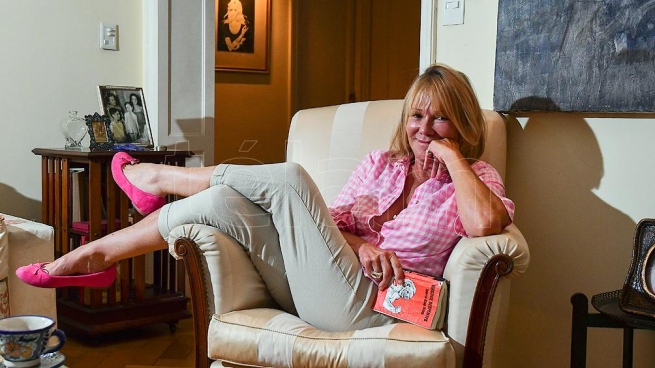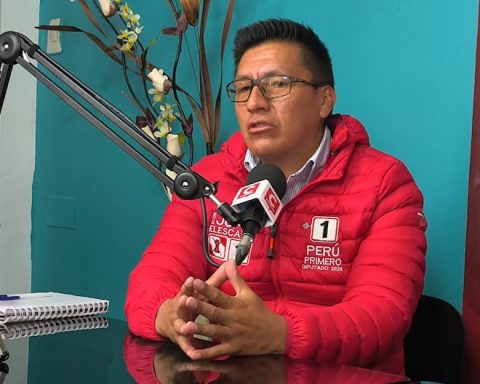Soledad Silveyra, who gave life to the capricious but passionate Mónica Helguera Paz in the emblematic telenovela “Rolando Rivas, taxi driver” created by Alberto Migré, which celebrates 50 years this Monday since its first broadcast on the old Channel 13, assured that the strip occupies a “fundamental” place in his career and that what defines its validity is “the passion” with which it was done.
“I get emotional immediately,” confesses Solita, consulted by Télam about her feelings for the half-century of life of fiction in which she embodied the romantic interest of the title character and who was immortalized by Claudio García Satur.
It was not the first great success of Silveyra, who had started in the trade at just 12 years old and by 1972 he already had such important titles as “Love has a woman’s face”, “High comedy” or “This is how the villa como en el cielo” on TV, or “A boy like me” (1968) with Palito Ortega and “Gitano” (1970) with Sandro.
The 50th anniversary of “Rolando…” finds her with a play on the bill -“Locas de remate”, at the Astral together with Verónica Llinás-, and active as a grandmother, but willing to review some of her impressions so many years later
It certainly wasn’t the last either, in a tireless career in film, theater and television that had numerous milestones -such as “Champions of Life” (1999-2001), to mention just one of his most mature stage- and even driving experiences. like in “Big Brother”.
The 50th anniversary of “Rolando…” finds her with a play on the bill -“Locas de remate”, at the Astral together with Verónica Llinás-, and active as a grandmother, but willing to review some of her impressions so many years later.
Silveyra spoke with this agency about the genius of Migré, the love of the public and even made a confession about the fiery connection he had with García Satur.
Télam: What happens to you when you see that 50 years have passed since “Rolando Rivas”?
Soledad Silveyra: I get excited immediately, it’s a life. Everything I worked on, everything I discovered, everything I learned, the actors, the theater, and television. The one we used to do, that we all worked 18 hours with a passion that I haven’t seen for years. With Migré in control putting on the music, it was all a phenomenal team. I don’t know how we could work so hard, but it was wonderful.
T: Do you feel that TV no longer exists?
H.H: It’s another telly. Without a doubt. It is another world too. Technology changed everything, and today the platforms rule.
T: What do people say to you today? Do you remember the character?
H.H: Just recently a tachero took care of me, he helped me, who came with clothes, with bags, I pay him and when he gives me the change I tell him “he’s undercharging me” and he replies “it’s going to be 50 years of ‘Rolando Rivas’, Alone, I’m in this taxi for Rolando.” Is incredible. And when they’re young too, they tell me “Wow, my old man loved novels.” I think that what happened with “Rolando” was that magic that men saw it, I think it was the first novel that transcended the female gender.
T: Why do you think that could happen?
H.H: Because of what “Rolando” had, because of what Claudio was; the enormous protagonist of this is him, who built that character. Then the couple, we had incredible chemistry and for some reason I did a first year and I left… I was in love with my husband, and I saw that his hand was dangerous… (laughs)
T: With what you say there is no need to ask Claudio as a partner…
H.H: There was a total chemistry, and he is also a type of nobility that I respect, that I love, that we continue to talk to. A guy who talks about “not betraying himself”. I love him, really.
T: How was it that you were called for “Rolando Rivas”?
H.H: From what I understand, I think that Migré wanted Nora (Cárpena, who ended up replacing her in the second season of 1973 when Silveyra left) from the start and that it seems that it was the channel, where I had done the previous year “So in the village like in heaven” the one who asked to be me.
T: When they started, did you imagine that it would be the success that it was? What would the country stop to see them every week?
H.H: The program did not start well, Claudio told me the other days. That it took us about two months to grow until we reached 40 rating points. But the passion with which we did it was so great, and we liked it so much that I don’t remember what I thought at the time.
For me we reached success one day when we were going to Córdoba for an award, Bredeston and Beatriz Taibo were going, who were the couple of the moment, and we were just starting out. We arrived in Córdoba and there were… I don’t know, 200 taxis; It was shocking, all the people shouting “Rolando y Mónica”. We got into a Peugeot and started to parade with all the other taxis through the streets of Córdoba, in the middle of Argentine flags and we looked like Perón and Evita (laughs). And Claudio told me “let’s not believe anything, because this is today and tomorrow may not be, let’s not lose our humility”.
T: Do you see the legacy of “Rolando Rivas…” and what Migré was doing on television today?
H.H: It is another time, it is difficult. We had the teletheater market as a genre, of those romantic soap operas. Now there is like a generation of soap operas that were followed by the Turks, that people see the landscape too, get to know other cultures. And they’re romantic, and slow, but they work, and they’re very well done.
T: What place does “Rolando Rivas…” occupy in your career?
H.H: Basic, basic. I think that what sums up “Rolando Rivas…” is the passion, that of all of us who were involved. I haven’t seen everyone’s passion in a while.

















